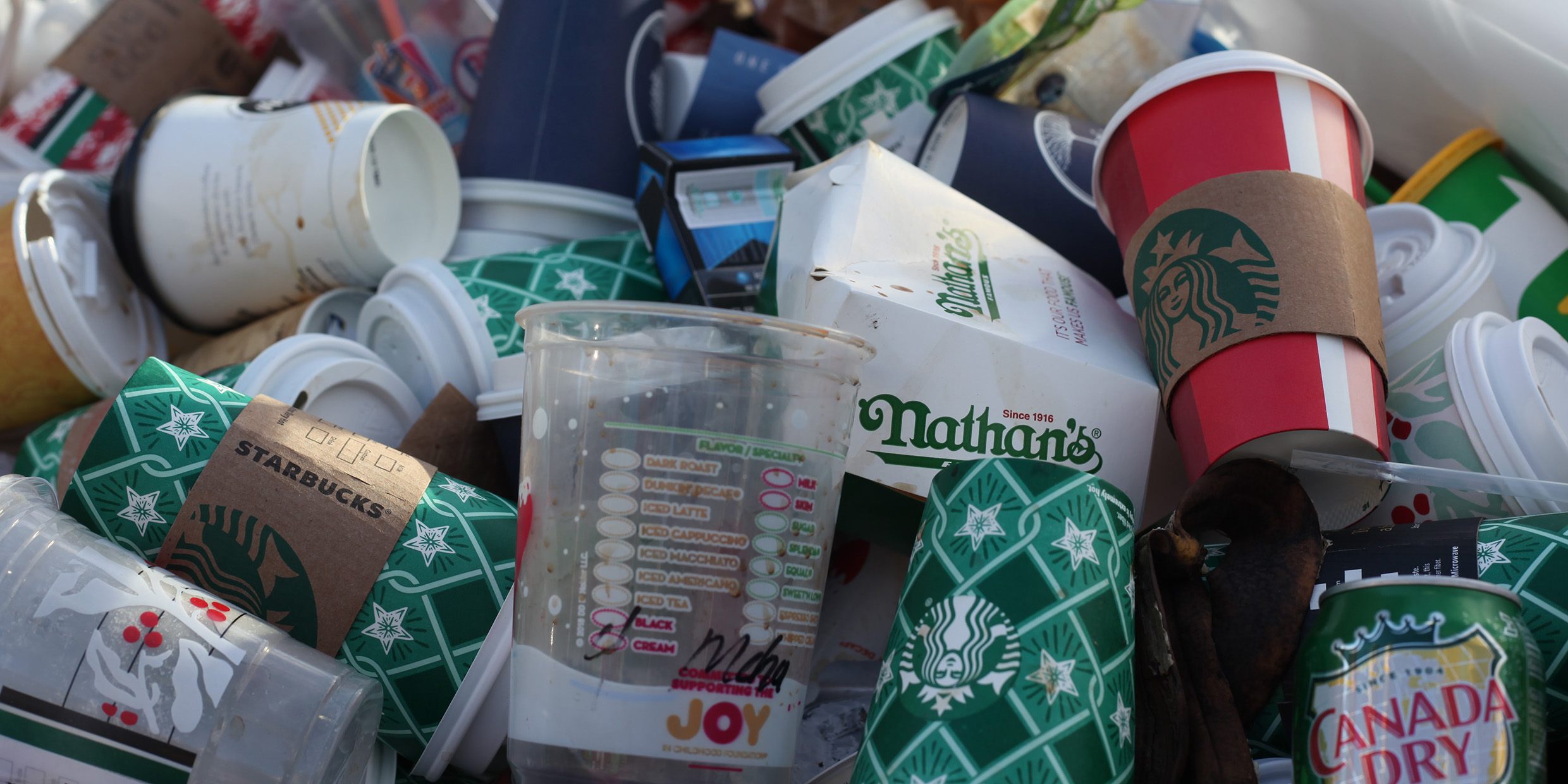Originally published 17 October 1994
Sunday evening. Jumping up and down on the contents of the huge rolling trash bin, trying to make room for a few more bags — of what? Wine bottles, junk-mail catalogs, computer-printouts of drafts of this column, a week’s worth of Boston Globes and the New York Sunday Times.
How is it possible that two people can make so much waste? Twelve cubic feet of jam-packed paper, glass, tin, and plastic. The leavings of a rather modest life, no conspicuous consumption here.
Hey, I’m a guy who straightens bent nails. I re-use razor blades until they draw blood. Most homes have a junk drawer; at our house every drawer is a junk drawer. Waste not, want not, that’s our motto. Still, thank God the trash receptacle has wheels. Otherwise, I’d never be able to drag it to the street.
And that’s just the stuff I toss out directly. There’s also the vast waste I’m indirectly responsible for: the carcinogen-tainted water, poisonous fumes, ozone-depleting chemicals, and spent radioactive fuel. The toxic outpourings of “civilized” life.
Sometimes it seems we will not survive our own effluents. But wait. Let’s put this in perspective. It’s not the first toxic waste crisis in the history of life. We’ve been there before, and we survived.
Consider the first living creatures of the Earth, the single- celled microbes that inhabited the planet nearly 4 billion years ago. Those were the good old days. Life was simple. Live in the sea, graze on sugar, ferment the sugar to get energy to live.
Brewers today use something of the same process. Sugar is broken down into carbon dioxide, alcohol, and energy. Brewers, of course, want the alcohol. Our earliest microbial ancestors wanted energy. Alcohol was an unwanted byproduct. And a dangerous one at that.
It was the first toxic waste crisis.
Alcohol is poisonous to living things, as anyone who has experienced a hangover knows. Our alcohol-producing microbial ancestors presumably stewed in their own toxic juice, permanently buzzed, living an unending morning-after.
Meanwhile, as life proliferated, it was running out of food. In the warm seas of the early Earth, sugary molecules were cooked up by crackling lightning storms, the sun’s ultraviolet light and radioactivity. These molecules were sustenance for the first living organisms. But the spontaneous synthesis of carbohydrates couldn’t keep up with life’s burgeoning numbers. A crisis of want was in the making.
Then life invented photosynthesis.
Certain early bacteria, ancestors of plants, evolved a way to turn carbon dioxide, water, and sunlight into sugar. The food crisis was solved. Now life moved to a new plateau of self-sufficiency — an agricultural lifestyle, if you will, rather than a life based on scavenging. Unfortunately, this chemical breakthrough into self-sufficiency included a deadly by-product: oxygen.
The second toxic waste crisis.
Oxygen combines promiscuously with almost anything. Iron rusts, wood burns, life decays — all forms of oxidation. As living organisms made carbohydrates from sunlight, the level of free oxygen built up in the environment. Our microbial ancestors were in danger of burning themselves up, of going up in smoke.
For a time, the oxygen produced by photosynthesis combined with iron dissolved in sea water. Iron oxides precipitated out of solution and accumulated on the ocean floor.
These iron-rich sediments were like a vast landfill, taking up and rendering harmless life’s waste. But eventually, about 2 billion years ago, the seas had been swept clear of iron and the level of oxygen in the atmosphere began to dangerously rise. Fortunately, life had used the interval to learn how to tolerate oxygen and turn it to good use. It invented respiration.
With respiration, life had found a way to get energy from carbohydrates by oxidation, without the alcohol by-product of fermentation. And by breaking down the carbohydrate molecules more completely, more energy was made available than previously.
Respiration solved not one but two toxic waste crises. Life sobered up. Oxygen was turned to good use. Fermenting microbes faded from prominence, and, with their greater energy resources, the respirers got down to the business of inventing sex.
Let’s not sell our microbial ancestors short. They faced two toxic waste crises of monumental proportions and found within themselves the resources to cope or turn waste to advantage.
Here are the lessons we can learn from them:
1) Progress always involves some waste.
2) Landfills are temporary solutions.
3) Life on Earth will adapt to our worst foulings of the environment.
But before we become too complacent, there is also:
4) Life will adapt to our worst foulings of the environment, but it may take millions of years to do so, and our own continued existence might not be part of the solution.



